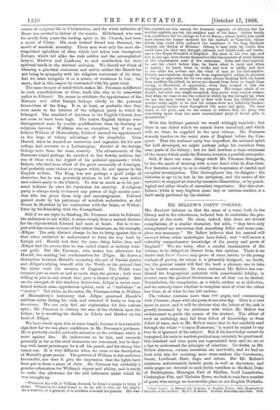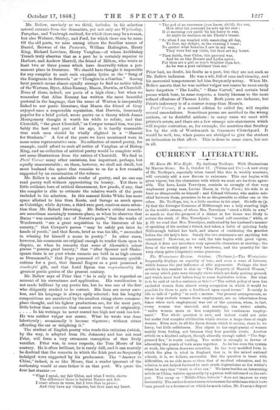MR. BELLEW'S POETS' CORNER.
Mn. BELLEW informs us that the sense of a want, both in the library and in the schoolroom, induced him to undertake the pro- duction of this work. He owns, indeed, that there are several compilations of a similar character, but adds, "they have only strengthened my conviction that something fuller and more com- plete was necessary." Mr. Bellew believes that his manual will succeed where other anthologies have failed, and "will secure a tolerably comprehensive knowledge of the poetry and poets of England." We are sorry, after a careful examination of the volume, to be obliged to dissent from this opinion. There is no doubt that Poets' Corner may prove of some service to the young student of poetry, for whom it is primarily designed ; no doubt, too, the general reader will find the book a pleasant one to take up in leisure moments. In some instances Mr. Bellew has con- densed his biographical materials with considerable felicity, in several cases the poetical illustrations are all that can be desired. Nevertheless, the compilation, as a whole, strikes us as defective, and we scarcely know whether to complain most of what the editor has done, or of what he has left undone.
The volume contains more than 900 pages, and commencing with Chaucer, closes with the poets of our own day. Here is a vast space to cover, and it will be obvious that the labour of the task is greatly increased by the criticisms with which Mr. Bellew has endeavoured to guide the course of the student. The editor of such an anthology may fail from defect of knowledge or from defect of taste, and as Mr. Bellew states that he has carefully read through the whole " Corpus Poetarum," it would be unjust to say that he is ignorant of his subject. But if his knowledge cannot be impugned, his taste in matters poetical may certainly be questioned. One hundred and nine poets are represented here, and we are at a loss to understand the principle of selection. No doubt, as Mr. Bellew observes, certain omissions are inevitable, and we find no fault with him for omitting mere verse-makers like Cawthorne, Smart, Loviboud, Hart, Jago, and others. But Mr. Bellew's omissions unfortunately include poets as well as rhymsters, and while pages are devoted to such feeble versifiers as Sheffield Duke of Buckingham, Montague Earl of Halifax, Lord Lansdowne, Christopher Pitt, and Nicholas Rowe, we look in vain for a number of poets who occupy an honourable place in our English Walhalla.
• Poets' Corner, A Manual for Students in English Poetry, with Biographical Sketches of the Authors. By J. C. 31. Bellew. London: BouUedge and Sons. 180.
Mr. Bellew, unwisely as we think, includes in his selection several extracts from the dramatists, yet not only are Wycherley, Farquhar, and Vanbrugh omitted, for which there may be a reason, but also Webster, Shirley, and Ford, for which there can be none.
Of the old poets, we miss among others the familiar names of Daniel, Browne of the Pastorals, William Habington, Henry King, Richard Lovelace, Henry Vaughan—of whom Archbishop Trench truly observes that as a poet he is certainly superior to Herbert, and Andrew Marvell, the friend of Milton, who wrote at least two or three poems which have deservedly taken a per- manent place in literature. We should have thought it impossible
for any compiler to omit such exquisite lyrics as the "Song of the Emigrants in Bermuda" or" Thoughts in a Garden." Among later poets it seems almost equally strange to find no notice taken of the Wartons, Dyer, Allan Ramsay, Mason, Darwin, or Churchill.
None of these, indeed, are poets of a high class ; but when we remember that Allan Ramsay has written the most beautiful pastoral in the language, that the name of Warton is inseparably linked to our poetic literature, that Mason the friend of Gray enjoyed once a respectable reputation, that Darwin, immensely popular for a brief period, wrote poetry on a theory which James Montgomery thought it worth his while to refute, and that Churchill, "the great Churchill," as Cowper termed him, was pro- bably the best read poet of his age, it is hardly reasonable that such men should be wholly slighted in a "Manual for Students." A few of the poets we have mentioned were in some sense representative men. No collection of sacred poetry, for -example, could afford to omit all notice of Vaughan or of Bishop
King, and no collection of satirical poetry would be complete with- out some illustrations from the satires of Churchill. We find in Poets' Corner many other omissions, less important, perhaps, but equally unaccountable ; on these, however, we shall not dwell, but must husband the space that remains to us for a few remarks suggested by an examination of the volume.
Mr. Bellew is an admirable reader of poetry, and no one can read poetry well without appreciating its beauty. Yet there is little evidence here of critical discernment, few proofs, if any, that the compiler is able to estimate the relative worth of the poets included in his selection. In this manual Kirke White has more -space allotted to him than Keats, and Savage as much space as Coleridge, while Aytoun, a third-rate poet, receives more atten- tion than Mr. Robert Browning. Mr. Bellew's critical remarks are sometimes amusingly common-place, as when lie observes that Burns "was essentially one of Nature's poets," that the works of Wordsworth "are •a great acquisition to the literature of his country," that Cowper's poems "may be safely put intot he hands of youth," and that Keats, brief as was his life, "succeeded in winning for himself a name in poetry." In other cases, however, his comments are original enough to render them open to dispute, as when he remarks that some of Akenside's minor poems "possess great beauty," that "after Spenser and Shake-
speare there is no poet whose sonnets are held in as high esteem as Drummond's," that Pope possessed all the necessary qualifi- cations for a poet, that Samuel Rogers as a poet possessed a wonderful gift, and that Lord Byron was unquestionably the greatest poetic genius of the present century.
Mr. Bellew says of Prior that "he is only to be regarded on account of his correctness and application. His versification is not made brilliant by any poetic fire, but he was one of the first who diligently studied to be correct. His lines are never care- less, and his language is always aptly selected ; but his lengthy compositions are unrelieved by the smallest rising above common- place thought, and his lighter productions are, for the most part, little better than conceits that cannot even boast of originality.
• . . . In his writings he never soared too high nor sank too low.
He was neither vulgar nor coarse. What he wrote was done laboriously ; occasionally it became vigorous ; without either offending the ear or delighting it."
The student of English poetry who reads this criticism (which, by the way, is adopted from Dr. Johnson) and has not read Prior, will form a very erroneous conception of that lively versifier. Prior was, in some respects, the Tom Moore of his century. He is often brilliant, he is rarely dull, and it can scarcely be doubted that the conceits in which the Irish poet so frequently indulged were suggested by his predecessor. The "Answer to Chloe," indeed, is so like Moore, that a reader ignorant of the
authorship would at once father it on that poet. We quote the four last stanzas :— "What I speak, my fair Chloe, and what I write, shows The difference there is betwixt Nature and Art. I court others in verse, but I love thee in prose;
And they have my whimsies, but thou haat my heart. "The god of us versemen (you know, child), the sun, How after his journeys he sets up his rest ; If at morning o'er earth 'tis his fancy to run, At night he declines on his Thetis's breast.
"So when I am wearied with wandering all day, To thee, my delight, in the evening I come ; No matter what beauties I saw in my way, They were but my visits, but thou art my home.
"Then finish, dear Chloe, this pastoral war, And let us like Horace and Lydia agree; For thou art a girl as much brighter than her, As he was a poet sublimer than me."
Prior had, no doubt, his faults as a poet, but they are not such as Mr. Bellew indicates. Ile was a wit, full of ease and vivacity, and his mercurial temperament led him frequently astray. When Mr. Bellew asserts that he was neither vulgar nor coarse he must surely
have forgotten "The Ladle," "Hans Carvel," aud certain brief poems which bear, in some respects, a family likeness to the more refined effusions of Thomas Little. Both poets are indecent, but Prior's indecency is of a coarser stamp than Moore's.
Poets' Corner, if a second edition be called for, will require several emendations. Sometimes poems are ascribed to the wrong
authors, or to doubtful authors ; in many cases we meet with printer's errors, and there are a few strange mis-statements which will require correction, as, for example, the assertion that Southey lies by the side of Wordsworth in Grasmere Churchyard. It would be well, too, when poems are abridged to give the student an intimation to that effect. This is done in some cases, but not in all.



































 Previous page
Previous page